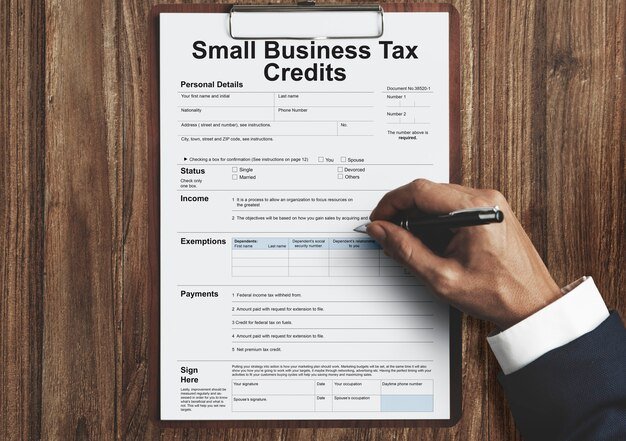
August 29, 2024 | by leonardben.420@gmail.com

If you run a small business, you probably know that handling your finances, especially dealing with income taxes, can be quite tricky. Small business owners often face various tax-related challenges, from figuring out complicated tax paperwork to making the most of deductions and understanding tax benefits. In this comprehensive guide, we’ll explore the world of small business tax credits, income tax, and financial incentives. We’ll provide you with the knowledge you need to reduce your tax payments, improve your financial well-being, and potentially qualify for valuable tax benefits. Whether you’re a new startup or an established small business, this article is a must-read because it offers valuable insights that can greatly impact your profits.
1. Understanding Small Business Tax Credits
What Are Small Business Tax Credits?
In the world of financial incentives, small businesses receive important benefits known as tax credits. These incentives, provided by the government, aim to reduce the taxes that small businesses have to pay. These credits are designed to support small business owners and encourage various activities, such as hiring employees, offering healthcare benefits, or investing in research and development. The Department of the Treasury and the Internal Revenue Service (IRS) play a crucial role in managing and overseeing these credits.
Depending on what a small business does and the specific tax year, they might be eligible for multiple tax credits. These credits, which come in various forms, have the power to significantly reduce the amount of income tax that small businesses have to pay, providing valuable financial relief to these entrepreneurs.
How Can Small Business Owners Benefit from Tax Credits?
For small business owners, tax credits have various advantages. They mainly help reduce the total amount of taxes they have to pay, which means they have more money to invest in their business, cover expenses, or expand. This is especially helpful for new businesses and those facing financial challenges, as these tax credits provide important financial relief.
Additionally, some specific tax credits, like the Work Opportunity Tax Credit, not only encourage businesses to hire people from specific groups, such as military veterans and those who depend on government assistance, but also contribute to creating a more diverse and inclusive workforce.
Are You Eligible for Small Business Tax Credits?
The eligibility requirements for tax credits for small businesses vary depending on the specific credit in question. While some credits are available to all small businesses, others are designed for specific industries or activities. For example, the Research and Development Tax Credit is aimed at promoting innovation and technological advancement, making it more relevant to businesses engaged in research and development activities.
It’s important to thoroughly understand the details of each tax credit and determine if a small business qualifies. In many cases, meeting specific requirements, maintaining detailed records, and submitting the necessary tax documents are necessary to claim the credit. It is advisable to seek guidance from a tax expert or work with the Internal Revenue Service to ensure that all requirements are met and to make the most of available tax credits.
2. Exploring Income Tax for Small Businesses
Income Tax Basics for Small Business Owners
In the world of running a small business, income tax is a crucial aspect that you can’t do without. Unlike larger corporations, many small businesses take the form of pass-through entities, which means the business’s earnings are reported on the owner’s personal tax returns. Understanding the details of income tax is very important to avoid unpleasant surprises during tax season and to effectively manage your business’s financial aspects.
If you are the proud owner of a small business, it’s your responsibility to keep accurate and meticulous records that track both the money your business brings in and the expenses it incurs. It’s vital to realize that the amount of tax you owe depends on the profit or net income, which must be included in your personal income tax filing. Maximizing the deductions and credits available to you is a crucial way to reduce your taxable income, ultimately lowering the amount you owe to the tax authorities.
Deductions and Business Expenses
One key strategy to reduce your taxable income is to claim deductions for business expenses. These deductions can include expenses such as rent, utilities, office supplies, and travel costs. By deducting these expenses, you reduce the overall income that is subject to taxation. However, it’s essential to keep thorough records and ensure that your deductions are legitimate and within IRS guidelines.
Navigating Tax Forms for Your Small Business
Navigating the complex process of filing your income tax return as a small business owner can be a complicated task, depending on the structural details of your business. Sole proprietors typically use Schedule C to provide details about their business income and expenses. On the other hand, partnerships, S corporations, and C corporations involve different sets of required forms and regulatory rules.
For owners of small businesses, the challenges in the field of income tax are unique and intricate. It is crucial to familiarize yourself with the specific paperwork and requirements that apply to your particular type of business. Utilizing the services of a tax professional, especially if you are self-employed, can simplify the entire process, ensuring that you take advantage of all available deductions and tax credits that you are eligible for.
3. Leveraging Tax Incentives for Small Businesses
The Power of Tax Incentives
Tax incentives are like special rewards from the government to encourage specific actions, such as investing in certain industries. They’re meant to help the economy grow and support small businesses. If you run a small business, you can use these incentives to reduce how much you have to pay in taxes and help your business grow.
One good example of a tax incentive for small businesses is the Research and Development Tax Credit. This credit is designed to encourage companies to spend money on new and innovative research projects. By using this credit, you can lower your tax bill while promoting creativity and progress in your company.
Research and Development Tax Credits
The Research and Development (R&D) Tax Credit is a valuable tax incentive that rewards businesses for investing in R&D activities. This credit supports innovation and technological advancement, making it particularly beneficial for businesses that engage in research to develop new products, processes, or technologies.
To claim the R&D Tax Credit, businesses must document their research activities and expenses. Eligible expenses may include employee wages, supplies, and contractor costs related to research and development projects. By claiming this credit, you can reduce your tax liability and reinvest those savings into your business.
Tax Credits for Small Business Health Care
Small small businesses often struggle with the complexities of providing health insurance for their employees. However, there is a way to ease the financial burden through tax deductions. The Small Business Health Care Tax Credit is designed to help small companies afford health coverage for their employees.
To qualify for this tax benefit, your business needs to meet certain requirements. These include having a workforce of fewer than 25 full-time equivalent employees, paying at least half of your employees’ health insurance premiums, and keeping average annual wages below a certain limit. This credit can be a significant financial incentive to offer health insurance to your staff, creating a mutually beneficial situation for both the company and its employees.
In the next part of this article, we will explore how starting a business can affect your financial situation and the various tax credits available to new entrepreneurs.
4. Starting a Business: Tax Considerations
The Importance of Tax Planning from Day One
When you’re starting a new business, it’s really important to carefully think about the financial consequences. Making smart decisions about taxes can help you set up your company well, keep good records, and take advantage of tax benefits.
One very important part of this is choosing the right legal structure for your business. The type of structure you pick can have a big impact on how much you have to pay in taxes. So, it’s essential to carefully look at the pros and cons of options like being a sole owner, having a partnership, or forming a corporation. Getting advice from a tax expert when you’re just getting started with your business can be incredibly helpful.
Tax Credits for Employee Retention
Starting a business often involves hiring employees, and there are potential benefits to be gained from carefully designed tax incentives that encourage workforce expansion and employee retention. One such tax credit, called the Employee Retention Tax Credit, is created to compensate businesses for keeping their employees during challenging economic times, like the significant impact of the COVID-19 pandemic.
To qualify for this tax credit, you must meet specific eligibility requirements, including experiencing a significant drop in overall revenue or facing government-mandated closures due to the pandemic’s effects. By claiming this financial recognition, you can reduce a portion of the financial costs associated with keeping your employees on the company’s payroll.
The Work Opportunity Tax Credit
The Work Opportunity Tax Credit (WOTC) is another tax credit that can benefit both new and established businesses. WOTC encourages businesses to hire individuals from specific target groups, such as veterans and individuals receiving government assistance.
Businesses that hire individuals from these groups can claim a tax credit based on the employee’s wages and hours worked. The WOTC not only provides a financial incentive but also fosters a diverse and inclusive workforce.
5. Tax Credit Support During COVID-19
The American Rescue Plan and Small Businesses
The COVID-19 pandemic brought significant challenges to businesses in the United States. To help small businesses cope with these tough times, the American Rescue Plan Act was put into action. This comprehensive relief package included several measures with the main goal of helping small businesses survive and recover.
One important aspect of the American Rescue Plan was the extension and increase of various tax benefits, like the Employee Retention Tax Credit and the Paid Leave Tax Credit. These changes were carefully designed to provide financial support to businesses dealing with difficulties caused by the pandemic.
Tax Credits to Help Businesses Navigate the Pandemic
During the pandemic, the Employee Retention Tax Credit (ERTC) became an important tool for businesses to help keep their employees. It allowed eligible companies to get a tax credit for a portion of the money they paid to their workers as wages.
At the same time, the Paid Leave Tax Credit helped businesses by reimbursing them for the cost of providing paid time off for sick leave and family or medical absences to their employees affected by the COVID-19 pandemic. This credit was designed to ease the financial burden on businesses while making sure that their employees could take time off when they needed to.
Filing Your Taxes in a Post-COVID World
As we move past the peak of the COVID-19 pandemic, it’s crucial for small business owners to stay aware of the changing tax landscape. Tax laws and rules are constantly changing, which could affect the tax benefits available to businesses.
Additionally, the COVID-19 pandemic has shown how important it is to be prepared for emergencies and have contingency plans. Small businesses should think about incorporating these lessons into their long-term tax strategies and overall business planning to make sure they can handle future challenges effectively.
6. State and Local Tax Credits
Beyond Federal Tax Credits
When it comes to taxes, it’s important to consider not just federal tax benefits but also the often unnoticed advantages provided by states and local governments. Many state and city authorities offer tax incentives to encourage small businesses to grow, create job opportunities, and invest money in their areas.
These incentives can vary a lot, depending on where you are. So, it’s crucial to carefully look into the incentives available in your specific location. Examples of these state and local benefits include not having to pay property taxes, not being responsible for certain sales taxes, and receiving financial support for specific business projects.
How State and Local Governments Support Small Businesses
In the complex world of supporting small businesses and local economies, state and local governments play a crucial role. They create specific financial incentives designed to meet the unique needs of their regions. Small businesses can benefit from these incentives by using them to secure extra funds and ongoing support for their growth.
State and city tax benefits can work together with federal tax credits to improve your business’s financial health. It’s a good idea to explore the opportunities available in your area and work closely with local resources, like economic development organizations, to make the most of these appealing incentives.
Maximizing Your Tax Credits at Every Level
To make sure you get the most out of tax benefits, it’s essential to have a comprehensive plan that considers federal, state, and local incentives. By understanding all the available tax credits and incentives, you can create a smart tax strategy that improves your business’s financial position.
Moreover, because the federal tax laws and rules are always changing, local governments may adjust their incentives based on these changes. Staying aware and adjusting your tax strategy can help you consistently take advantage of these valuable benefits.
Navigating the world of small business taxes, tax credits, and income tax can be complex, but with the right knowledge and strategies, you can optimize your financial position and potentially unlock valuable tax incentives. Whether you’re a startup entrepreneur or a seasoned small business owner, understanding the tax landscape is essential for reducing your tax liability and boosting your bottom line. Keep in mind that tax laws and regulations can change, so staying informed and seeking professional tax help when needed will help you make the most of available credits and deductions.
In summary, here are some of the key takeaways from this article:
•Small business tax credits can significantly reduce your tax liability and provide valuable financial relief.
•Understanding income tax and deductions is essential for small business owners to manage their finances effectively.
•Tax incentives, such as the Research and Development Tax Credit, can promote innovation and business growth.
•Starting a business requires careful tax planning and consideration of available tax credits.
•Tax credits have played a crucial role in supporting small businesses during the COVID-19 pandemic.
•State and local tax credits can further enhance your business’s financial health.
•Maximizing deductions and reducing taxable income are effective strategies for lowering your tax liability.
•Understanding the complex tax code and federal income tax is crucial for small business owners.
•Tax credits not only offer immediate financial benefits but also stimulate business growth and job creation.
By applying the knowledge gained from this article, you can take control of your small business’s financial future and make informed decisions that benefit both your business and your bottom line.

Keep it Professional You can use the theme already installed to build nice overlook or suggest something else too.


